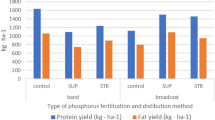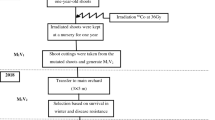Abstract
MOLYBDENUM deficiency under Irish conditions has previously been reported to occur in clovers and swede turnips1. During the 1953 season, a severe outbreak of whiptail on cauliflowers occurred on a commercial plot at one of the centres mentioned. The soil, which had an initial pH of 5.3, had received a dressing of 1½ tons of ground limestone per acre as well as a dressing of superphosphate, muriate of potash and sulphate of ammonia at 5, 2 and 3 cwt. per acre respectively.
This is a preview of subscription content, access via your institution
Access options
Subscribe to this journal
Receive 51 print issues and online access
$199.00 per year
only $3.90 per issue
Buy this article
- Purchase on Springer Link
- Instant access to full article PDF
Prices may be subject to local taxes which are calculated during checkout
Similar content being viewed by others
References
Walsh, T., Neenan, M., and O'Moore, L. B., Nature, 170, 149 (1952).
Walsh, T., Neenan, M., and O'Moore, L. B., Dep. Agric., Dublin, 47, 3 (1952).
Author information
Authors and Affiliations
Rights and permissions
About this article
Cite this article
NEENAN, M., GOODMAN, O. Varietal Susceptibility of Brassicas to Molybdenum Deficiency. Nature 174, 972–973 (1954). https://doi.org/10.1038/174972a0
Issue Date:
DOI: https://doi.org/10.1038/174972a0
This article is cited by
-
Kinetics of zinc absorption by excised roots of two sugarcane clones
Plant and Soil (1973)
Comments
By submitting a comment you agree to abide by our Terms and Community Guidelines. If you find something abusive or that does not comply with our terms or guidelines please flag it as inappropriate.



